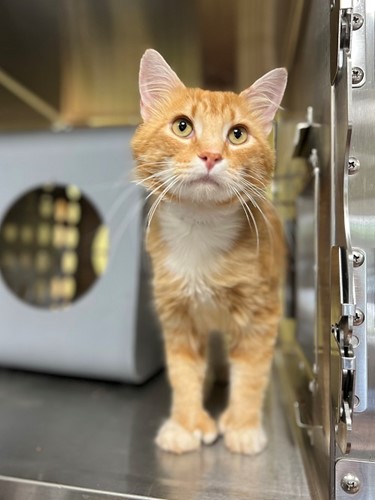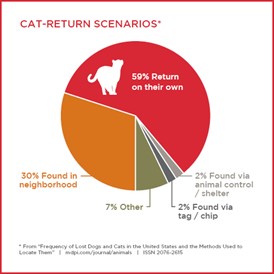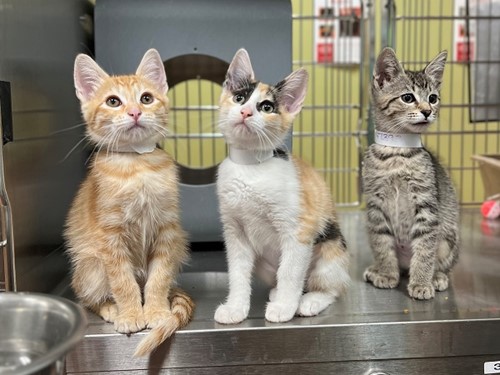
WAG Newsletter | July 2023
COMMUNITY CATS
Unlike the cat you have at home chasing toys and napping in the sun, community cats are those who prefer an outdoor lifestyle. They've figured out how to survive and sometimes even thrive outside.
So what are these cats and why does understanding their lifestyle matter? Let's get into it!
Pet Cats vs Stray Cats vs Feral Cats
One thing all of those names have in common: they're the same species - they're all domesticated cats. But stray and feral cats have a different relationship with humans than pet cats. 
- Pet Cats: They live in our homes, give us love, and boss us around. We scoop their litter boxes, feed them, and socialize them. They're accustomed to living indoors and appreciate companionship with people. In most cases, they're reliant on us for food and care.
- Stray Cats: Their comfort level with people will vary, but they typically have some degree of comfort with people. They may be friendly, social, and reliant on human caregivers for shelter and/or food. Or they may be fairly self-reliant and interested in the occasional hello or friendly pat. Stray cats may have once had a family or lived an indoor life, but they have adapted to outdoor life and prefer it.
- Feral Cats: Fearful of people, feral cats are unsocialized. They're unlikely to adapt to the life of a typical family pet, and trying to socialize feral cats can be traumatizing, so it's in their best interest to continue living outdoors.
Why does this matter?
Throughout the year, it's common for us to meet or even exceed our available space for cats - especially during the summer and fall months during kitten season (read more about kitten season in last month's WAG). Bringing an otherwise healthy stray cat to the shelter means there's less space for sick or injured cats and kittens who need help.
For unsocialized stray cats and feral cats, being in the shelter can have a serious detrimental effect on their behavior and well-being. And in a shelter environment, it's difficult (if not impossible) to provide appropriate conditions for behavioral rehabilitation and socialization. For many of them, their only placement options are as a barn cat or working cat, and demand for that type of adoption is low. It's safer for our entire feline community to keep stray and feral cats out of the shelter.
But what about lost cats?
We can hear you asking: "what about lost cats?" A lost cat is one who has become separated from their family and is unlikely to survive outside for long periods of time. And while these cats need to be reunited with their family, they usually don't need your help to do so. Recent studies have shown that lost cats are 10-50 times more likely to find their way home if they stay where they are instead of being brought to the shelter (Source: National Animal Care & Control Association).
Breaking down the data for lost cats who return home:
- Returned on their own: 59%
- Found in their neighborhood: 30%
- Found because of a tag/microchip: 2%
- Found via animal control/shelter: 2%
- Other: 7%
With a return rate of only 2% for cats who enter the shelter, it's clear that cats are more likely to reconnect with their family outside of the shelter environment (source: MDPI Journal).
When to bring cats to the shelter
With all the reasons to not bring cats to the shelter, when should you? If a cat is visibly sick, injured, or in immediate danger, you should bring them to the shelter so we can help. If the cat in question doesn't meet those conditions, consider the following options to help them reunite with their family. Helping a cat return to its home without entering the shelter helps us prioritize space for pets who need our help.
- Ask your neighbors - The cat may be an indoor-outdoor cat who likes to roam the neighborhood. You may think it's lost and in need of help when it's actually just going about its routine.
- Try social media - Tools like neighborhood Facebook groups, NextDoor, Craigslist, and others can be great ways to help cats without unnecessarily displacing them. Get a good photo of the cat and ask your local network!
- Check for ID - If the cat has a collar, check to see if there's a tag with an owner's phone number. Or, if the cat is amenable, take it to your neighborhood vet and scan for a microchip.
- Paper collars - A simple and easy option, paper collars can be a great way to attempt to locate the owner of a pet who visits your property. Here's an example.
Impact on HSSW
This summer, we updated our website to provide more information about kennel space for cats (you'll find level 1-3 capacity info on our Lost and Found page). This helps specify how and when we can accept healthy stray cats. Currently, we are at a Level 3 capacity, not accepting healthy strays.
As HSSW, like other shelters in our community, meets and exceeds our capacity, finding alternatives for cats entering the shelter unnecessarily is essential. When kennel space is prioritized for sick, injured, and at-risk cats, we can ensure our resources and space are available for the animals who truly need our help. Managing our intake to only cats in need increases the likelihood of a healthy lost cat returning to their family, and it has an beneficial impact on the cat population in our community as a whole.
How you can help
We rely on donors like you to ensure sick, injured, and at-risk cats in our community can receive the care and support they need. Your donation makes an immediate impact for the cats and kittens in our care. And you can share this article with your friends, and neighbors to help ensure our community knows how (and when) to help cats in need. This is a community problem, requiring a community solution.
More resources
You'll find great resources and information from our friends at Feral Cat Coalition of Oregon, providing information and resources for communities in the Portland Metro Area including Southwest Washington. And you'll also find excellent resources and more general information about community cats from Alley Cat Allies.
While many cats found roaming are harmless, we also understand they are not always welcome at your home or property. You can find tips for deterring outdoor cats on our Community Cats page.
Summer Safety for Pets
Dog days of summer? We're feeling it. Recent days have been the hottest days in the planet's recorded history. It was just a few years ago that the Pacific Northwest heat dome, a heat event with exceptionally high temperatures, had a devastating impact on pets and people. But safety in the summer heat starts well before we reach temperatures exceeding 110 degrees. And summer safety is about more than just heat - learn more in our safety tips below. 
- Hot pavement and cars - One of the biggest concerns during warm days, taking your dog or other pet out for a walk or a drive on a hot day can lead to burned pads and serious medical concerns including death. When days are warm and sunny, walk your dog in the morning and at night when it's cooler. And never leave your pet in the car in warm weather - temperatures can quickly climb to fatal levels and leaving the windows open doesn't doesn't necessarily help.
- Consider their breed and age - Warmer weather can have a more serious impact on certain breeds of animals. Animals with flat faces, like pugs, bulldogs, and Persian cats, are more susceptible to heat stroke since they cannot pant as effectively. Owners of flat-faced breeds (boxer, pug, shih tzu, Persian cats, and other breeds with short muzzles) should take extra care to keep their pet cool and limit exercise during hot weather. Additionally, pets who are elderly, overweight, and those with heart or lung diseases, should be monitored closely with light activity during hot weather.
- License and microchip your pet - Hikes, long walks, trips to the dog park... PNW summers are a great time to get out and about with your pet. And getting out means an increased risk of your pet becoming separated from you. Make sure your pet is licensed and microchipped to increase the likelihood you'll be reunited if your pet becomes lost.
- Responding to animals in distress - If you encounter an animal in immediate distress, act quickly. Provide a shady space and cool water. If practical, bring the animal inside to an air-conditioned or cool space. In a residential area, knock on doors to see if anyone recognizes the animal - they may be able to help you get the animal back home. In non-residential areas, contact local businesses or offices to find a cool and safe space for the animal. If necessary, contact your local animal control agency. In any instance, if an animal is in distress and you suspect heatstroke, take the animal to the nearest vet.
- Remember parasite treatments - Summer months can see an uptick in fleas, ticks, and heartworm. Make sure you're taking the necessary steps to keep your pet healthy with the appropriate preventative treatments. Speak with your family vet for more information.
For more summer safety information, click here.
Kitten Adoption Events
They're the cutest events you could imagine. Coming this summer to HSSW, we're making it even easier to adopt a kitten with reserved times to meet and adopt at Kitten Adoption Events. These events feature HSSW foster kittens who are not available on the adoption floor. And because it's an "event" we'll have refreshments for registered families and friendly staff and volunteers to help with all of your kitten-adopting needs. 
These events begin July 29 and will be added as needed through kitten season. Kittens aren't yet scheduled for the event, but times are already available at hssw.org/kittenevents. Learn more about the kitten adoption events and the adoption process at hssw.org/adopt.
Better Together
Speaking of kitten adoption... Like many things, kittens are often better in pairs! If you're thinking about adopting a kitten, consider two! There are lots of benefits to adopting kittens in pairs.
- Having a friend they already know helps kittens settle into a new environment easier & faster. Plus, they entertain each other, which helps them stay out of trouble!
- Kittens learn from each other about how to behave, use the litter box, groom themselves, etc.
- Having a playmate helps kittens learn how to play safely and appropriately, reducing the risk of playful scratches and bites.
If you don't want to wait for an adoption event (and who could blame you?), meet kittens at hssw.org/kittens who are ready to go home with you today!
HSSW Newsletter
Want to stay in the loop with what's happening at HSSW? Click the link below to sign up for our monthly newsletter and other HSSW updates. We'll see you in your inbox!
